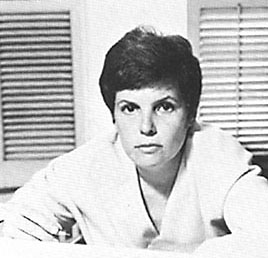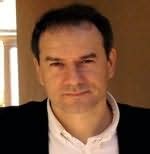A Quote by Elizabeth Gilbert
She followed the pleasure where it led. She had no weight, no name, no thoughts, no history. Then came a burst of phosphorescence, as though a firework had discharged behind her eyes, and it was over. She felt quiet and warm. For the first conscious moment of her life, her mind was free from wonder, free from worry, free from work or puzzlement. Then, from the middle of that marvelous furred stillness, a thought took shape, took hold, took over. I shall have to do this again.
Related Quotes
She closed her eyes and jumped. For a moment she felt herself hang suspended, free of everything. Then gravity took over, and she plunged toward the floor. Instinctively she pulled her arms and legs in, keeping her eyes squeezed shut. The cord pulled taut and she rebounded, flying back up before falling again. As her velocity slowed, she opened her eyes and found herself dangling at the end of the cord, about five feet above Jace. He was grinning. 'Nice', he said. 'As graceful as a falling snowflake.
At that moment a very good thing was happening to her. Four good things had happened to her, in fact, since she came to Misselthwaite Manor. She had felt as if she had understood a robin and that he had understood her; she had run in the wind until her blood had grown warm; she had been healthily hungry for the first time in her life; and she had found out what it was to be sorry for someone.
She didn't care anymore... and she got no pleasure from the work she did, but she did it. Everything bored her. She found that when she didn't have a notebook it was hard for her to think. The thoughts came slowly, as though they had to squeeze through a tiny door to get to her, whereas when she wrote, they flowed out faster than she could put them down. She sat very stupidly with a blank mind until finall 'I feel different' came slowly to her mind. Yes, she thought, after a long pause. And then, after more time, 'Mean, I feel mean.
For the first time in a long time I thought about Maman. I felt as if I understood why at the end of her life she had taken a 'fiancé,' why she had played at beginning again. Even there, in that home where lives were fading out, evening was a kind of wistful respite. So close to death, Maman must have felt free then and ready to live it all again. Nobody, nobody had the right to cry over her. And I felt ready to live it all again too.
With her foot on the threshold she waited a moment longer in a scene which was vanishing even as she looked, and then, as she moved and took Minta's arm and left the room, it changed, it shaped itself differently; it had become, she knew, giving one last look at it over her shoulder, already the past.
She thought in would be awkward for both to be brought into conscious collision; and fancied that, from her being on a low seat at first, and now standing behind her father, he had overlooked her in his haste. As if he did not feel the consciousness of her presence all over, though his eyes had never rested on her!
And then they would watch her closely as the dark, coagulated masses took form before her eyes, became flesh and bone, became gradually human. For all their show of reluctance, she had a sense that they enjoyed introducing her to these horrors, as seducers took pleasure in the corruption of innocence.
She expected the pain, when it came. But she gasped at its sharpness; it was not like any pain she had felt before. He kissed her and slowed and would have stopped. But she laughed, and said that this one time she would consent to hurt, and bleed, at his touch. He smiled into her neck and kissed her again and she moved with him through the pain. The pain became a warmth that grew. Grew, and stopped her breath. And took her breath and her pain and her mind away from her body, so that there was nothing but her body and his body and the light and fire they made together.
When he nodded, the physician disappeared into thin air, and then a moment later, Payne felt a warm palm encompass hers. It was Vishous's un-gloved hand against her own and the connection between them eased her in ways she couldn't name. Verily, she had lost her mother . . . but if she lived through this, she still had family. On this side.
Though at this moment she felt abused, abandoned, and ashamed of herself, Madeleine knew that she was still young, that she had her whole life ahead of her--a life in which, if she persevered, she might do something special--and that part of persevering meant getting past moments just like this one, when people made you feel small, unlovable, and took away your confidence.
Her thoughts ran away to her girlhood with its passionate longing for adventure and she remembered the arms of men that had held her when adventure was a possible thing for her. Particularly she remembered one who had for a time been her lover and who in the moment of his passion had cried out to her more than a hundred times, saying the same words madly over and over: "You dear! You dear! You lovely dear!" The words, she thought, expressed something she would have liked to have achieved in life.
She didn't feel thirty. But then again again, what was being thirty supposed to feel like? When she was younger, thirty seemed so far away, she thought that a woman of that age would be so wise and knowledgeable, so settled in her life with a husband and children and a career. She had none of those things. She still felt as clueless as she had felt when she was twenty, only with a few more gray hairs and crow's feet around her eyes.
Yet there were times when he did love her with all the kindness she demanded, and how was she to know what were those times? Alone she raged against his cheerfulness and put herself at the mercy of her own love and longed to be free of it because it made her less than he and dependent on him. But how could she be free of chains she had put upon herself? Her soul was all tempest. The dreams she had once had of her life were dead. She was in prison in the house. And yet who was her jailer except herself?
Day and night she had drudged and struggled and thrown her soul into her work, and there was not much of her left over for anything else. Being human, she suffered from this lack and did what she could to make up for it. If she passed the evening bent over a table in the library and later declared that she had spent that time playing cards, it was as though she had managed to do both those things. Through the lies, she lived vicariously. The lies doubled the little of her existence that was left over from work and augmented the little rag end of her personal life.






































